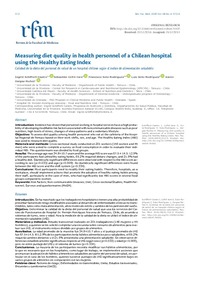Calidad de la dieta del personal de salud de un hospital chileno según el índice de alimentación saludable
Autor
Cofré-Jara, Sebastián
Schifferli-Castro, Ingrid
Soto-Rodríguez, Francisco
Soto-Rodríguez, Luis
Vargas-Nuñez, Karen
Fecha
2020Resumen
Introduction:
Evidence has shown that personnel working in hospital services have a high proba-bility of developing modifiable risk factors associated with noncommunicable diseases such as poor nutrition, high levels of stress, changes of sleep patterns and a sedentary lifestyle.
Objective:
To assess diet quality among health personnel who eat at the cafeteria of the Hospi-tal Regional de Temuco based on their work shifts, sex, and age. The Healthy Eating Index (HEI) was used to measure diet quality.
Materials and methods:
Cross-sectional study conducted on 201 workers (156 women and 45 men) who were asked to complete a survey on food consumption in order to evaluate their indi-vidual HEI. The questionnaire was divided by food groups.
Results:
The average age was 34.8±10.7 years and the average HEI score was 67.5 ± 14.5. 12.9% of the participants had unhealthy eating habits, 65.2% required dietary changes, and 21.9% had a healthy diet. Statistically significant differences were observed with respect to the HEI score ac-cording to sex (p=0.033) and age (p=0.009). No statistically significant differences were found between the HEI score and the shift system (p=0.334).
Conclusions:
Most participants need to modify their eating habits. Therefore, hospitals, as a workplace, should implement actions that promote the adoption of healthy eating habits among their staff, particularly in the case of men, who had significantly low HEI scores in several food groups compared to women.
Fuente
Revista de la Facultad de Medicina, 68(4), 512-516Link de Acceso
Click aquí para ver el documentoIdentificador DOI
doi.org/10.15446/revfacmed.v68n4.76500Colecciones
La publicación tiene asociados los siguientes ficheros de licencia:


